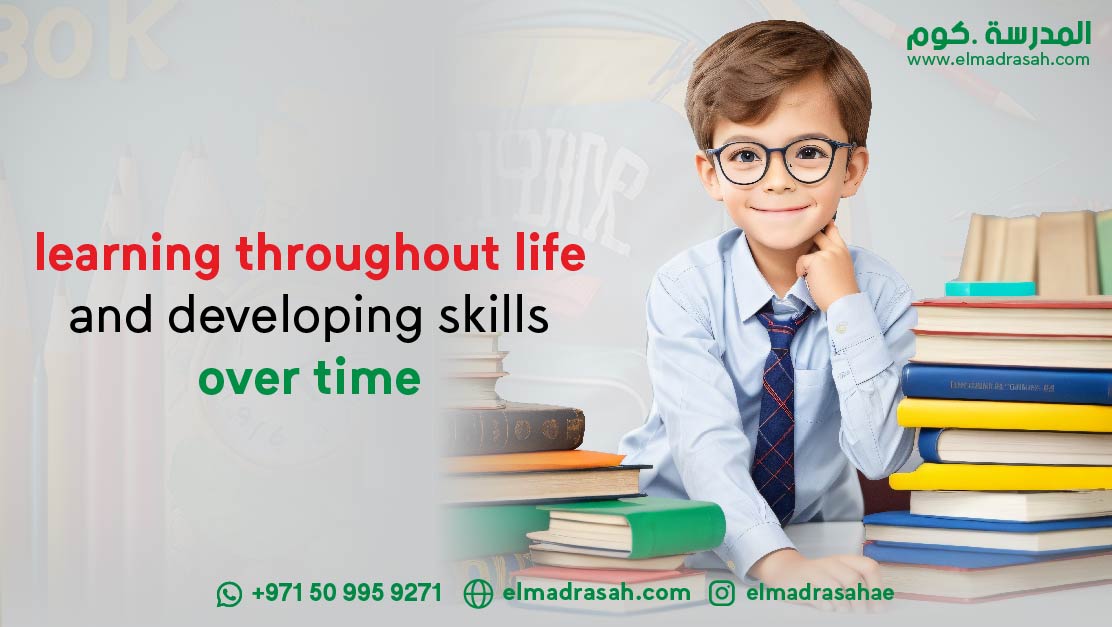
Lifelong Learning journey, a continuous process that accompanies us throughout our existence. From the moment we take our first breath to the day we draw our last, we find ourselves immersed in a perpetual cycle of learning. Learning across the lifespan is not confined to formal education but encompasses an array of experiences, interactions, and self-directed exploration. In this essay, we delve into the idea of “Learning across the Lifespan” and how it empowers individuals to develop skills over time. We will explore the significance of this enduring journey, how it shapes us, and how it aids us in developing study skills while enabling us to apply knowledge and skills in daily work.
The Lifelong Learning Paradigm
The Inherent Nature of Learning
Learning is a natural, inherent trait of human beings. From the moment we are born, we absorb information from the world around us. This constant stream of information becomes the foundation upon which we build our knowledge, skills, and abilities.
Development Over Time
As we navigate the journey of life, we discover that learning is not a static endeavor. It is a dynamic, ever-evolving process that transforms with time. This journey offers countless opportunities to develop skills over time. Whether it’s picking up a musical instrument, learning a new language, or mastering a trade, the development of skills over time is a central theme of learning throughout one’s life.
Benefits of Lifelong Learning
Intellectual Growth and Fulfillment
Lifelong learning not only enhances our knowledge but also nurtures our intellectual growth and fulfillment. Learning stimulates our minds, keeps us engaged, and helps us develop skills over time that enrich our lives in countless ways.
Adaptation and Resilience
The ability to learn throughout life equips us with the tools needed to adapt to an ever-changing world. Lifelong learners are more resilient, capable of navigating shifting job markets, societal changes, and personal challenges.
How to keep Lifelong Learning
Formal and Informal Learning
Learning across the lifespan encompasses both formal and informal education. Formal education provides structured knowledge and skills, but informal learning often offers the most valuable lessons. It is in informal settings that individuals tend to develop study skills, practical knowledge, and the ability to apply these skills to real-world situations.
Developing Study Skills
Developing study skills is a crucial component of lifelong learning. Effective study habits enable individuals to grasp new information, retain it, and apply it effectively. These skills are not limited to academia; they can be applied in any learning context. Whether it’s reading, researching, or analyzing, mastering study skills enhances one’s ability to learn and grow.
The Learning Odyssey
Children as Sponges
Children exemplify the notion of learning across the lifespan. From their earliest days, they are like sponges, soaking up knowledge from their surroundings. Their innate curiosity fuels their thirst for understanding, and this continuous cycle of exploration helps them develop skills over time.
Adolescence and Young Adulthood
As individuals progress through adolescence and young adulthood, their learning experiences expand. They become more self-directed, exploring subjects and skills of personal interest. During this period, the foundation for lifelong learning is solidified, and individuals often develop study skills tailored to their unique needs.
Adulthood and Lifelong Learning
The Adult Learner
Adulthood is not the end of the learning journey; it is the continuation of a lifelong endeavor. Adults often pursue education, training, and self-improvement, driven by various motivations such as career development, personal enrichment, or adapting to changes in their lives. This phase is a testament to the idea that one can develop skills over time, regardless of age.
Learning at Work
In the professional realm, individuals apply knowledge and skills they have acquired over their lifetime. The workplace is an ecosystem of learning where employees must continually adapt and develop study skills to remain competitive and contribute effectively to their organizations. To apply knowledge and skills in daily work is not just a necessity; it’s a cornerstone of career success.
Late Adulthood and Beyond
The Elder Learner
Late adulthood is often seen as a period of rest and retirement, but for many, it is a time of continued intellectual and personal growth. Whether it’s picking up a new hobby, learning to use technology, or exploring the world, the elderly demonstrate that the thirst for knowledge and the ability to develop skills over time persist throughout life.
Intergenerational Learning
Late adulthood can also be a time of intergenerational learning, where wisdom and knowledge are passed down to younger generations. The elderly can share their lifetime of experiences and knowledge, helping to shape the learning journey of those following in their footsteps.
Challenges and Opportunities
Overcoming Barriers
Learning across the lifespan is not without its challenges. Life responsibilities, health issues, and financial constraints can create barriers to continuous learning. However, these challenges also present opportunities for resilience and adaptation. Overcoming obstacles and persisting in the pursuit of knowledge is a testament to the human spirit’s indomitable nature.
The Role of Technology
In today’s digital age, technology has revolutionized learning. Online courses, e-learning platforms, and virtual libraries have made lifelong learning more accessible than ever. These tools empower individuals to develop study skills and apply knowledge and skills in daily work, transcending geographical boundaries and time constraints.
A Pathway to a Brighter Future
Empowering the Next Generation
By demonstrating the value of lifelong learning, we empower the next generation to embrace their own learning journeys. The skills and knowledge we pass down become the building blocks for their future success, enabling them to develop study skills, apply knowledge and skills in daily work, and make meaningful contributions to society.
Fulfillment in the Golden Years
As we reach the later stages of life, the skills and knowledge we have accumulated continue to serve us. The golden years become a time of fulfillment, reflection, and the passing on of our wisdom. Our lifelong learning journey provides a wellspring of satisfaction in our twilight years.
Learning across the lifespan is a testament to the incredible capacity of human beings to develop skills over time. It encompasses the experiences, challenges, and triumphs of childhood, adolescence, adulthood, and late adulthood. It’s about nurturing our innate curiosity, adapting to the changing world, and continually evolving our skills and knowledge. Throughout this journey, we develop study skills that empower us to learn effectively, and we apply knowledge and skills in daily work, contributing to personal and societal growth. As we pass the torch to future generations, our commitment to lifelong learning ensures a brighter and more informed future for all.















